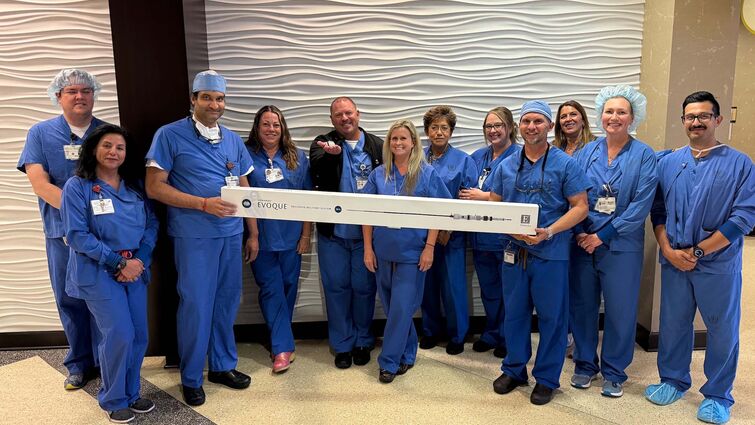
Doctors at Loma Linda University Medical Center–Murrieta are now performing tricuspid valve replacement using the recently approved Edwards EVOQUE device, a minimally invasive treatment that helps heart patients regain quality of life with improved energy due to effective blood flow.
Approved by the FDA last year, the device is a transcatheter valve replacement to help patients with severe tricuspid valve regurgitation, meaning that deoxygenated blood isn’t fully being pulled into the heart.
The tricuspid valve is the intake valve into the heart. It pulls in deoxygenated blood, which is then pumped from the ventricle to the lungs. When the tricuspid valve isn’t working properly, some of that deoxygenated blood is regurgitated and leaks backwards into the circulatory system.
Niraj Parekh, MD, an interventional cardiologist at LLUMC–Murrieta, says the device helps patients dramatically and reduces the need for hospitalizations and medications that can affect kidney function.
“This new treatment is an innovative way to put a new valve into place that won’t be getting worse, effectively stopping deoxygenated blood from leaking backwards,” Parekh said.
The EVOQUE device is an alternative to open-heart surgery. Doctors deliver the device to the tricuspid valve by going through a vein starting in the patient’s groin. The device is set in place using several retention mechanisms, all of which doctors view using an echocardiogram. The procedure takes less than an hour.
Tricuspid valve malfunction can cause fatigue, shortness of breath, leg swelling, and require hospitalizations for heart problems. The condition is most commonly caused by underlying lung problems and problems on the opposite side of the heart. Other contributing factors can include degenerative tissue disease, clots, and medications for other diseases such as weight loss.
Parekh said the new device is a welcomed addition to the field because doctors have historically had challenges treating the tricuspid valve, which is located on the right side of the heart. The tricuspid valve doesn’t respond well to medications that have traditionally been prescribed to address issues stemming from problems with the left side of the heart, such as heart failure, congenital issues, or swelling.
LLUMC–Murrieta is one of only approximately 20 hospitals in the nation that now offers the procedure in addition to the 100 hospitals that were used as trial sites during research, Parekh said.
To learn more about heart care services at Loma Linda University Medical Center – Murrieta, visit their Heart & Vascular website or call 951-290-4533.
Watch a video animation of how this procedure is performed here.
